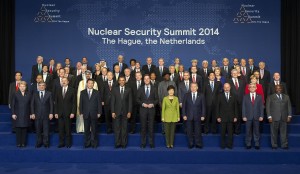 THE HAGUE – President Nursultan Nazarbayev was among the first world leaders to address the 3rd Nuclear Security Summit here on March 24 calling for more robust global efforts to secure nuclear materials through steps, such as countering nuclear terrorism, bolstering the UN watchdog agency and, ultimately, working toward complete global nuclear disarmament as the only guarantee of nuclear security internationally.
THE HAGUE – President Nursultan Nazarbayev was among the first world leaders to address the 3rd Nuclear Security Summit here on March 24 calling for more robust global efforts to secure nuclear materials through steps, such as countering nuclear terrorism, bolstering the UN watchdog agency and, ultimately, working toward complete global nuclear disarmament as the only guarantee of nuclear security internationally.
The Kazakh President called the summits, initiated by U.S. President Barack Obama in 2009, “a platform to address the most challenging issues on the international agenda,” and listed several priorities on which his country proposes focusing.
“First, general and complete nuclear disarmament is the only guarantee of nuclear security,” Nazarbayev said. “Second, countering nuclear terrorism and rooting it out remains an urgent task.”
At the same time, combatting nuclear-related terrorism “should not limit the right of states to pursue peaceful nuclear programmes, exchange technologies, equipment, knowledge and expertise,” he said, adding that Kazakhstan plans to develop its own full nuclear fuel cycle for nuclear power stations and build new nuclear power plants.
“Third, Kazakhstan stands for further strengthening of the role and authority of the International Atomic Energy Agency (IAEA). Fourth, Kazakhstan supports the creation of new nuclear-weapon-free zones, including in the Middle East,” the Kazakh President said, also explaining that Astana expects the five nuclear weapon states to ratify a protocol on negative security assurances to state parties to the Semipalatinsk Treaty, which established the Central Asian Nuclear-Weapons-Free Zone (CANWFZ).
He went on to list some of Kazakhstan’s recent achievements and ongoing projects.
In particular, Kazakhstan ranks 15th out of 25 countries with weapons-usable nuclear materials, in the Nuclear Threat Initiative’s (NTI) Nuclear Materials Security Index.
“This is explained by internal political and economic stability, effective legislation and anti-corruption policies,” Nazarbayev said. “Having shut down the Semipalatinsk nuclear test site and renounced the world’s fourth largest nuclear arsenal, Kazakhstan, in cooperation with the U.S. and Russia, dismantled the test site’s infrastructure. We continue work to ensure the security of the former nuclear test site.”
Generally, all nuclear activities in Kazakhstan are under IAEA’s comprehensive safeguards, meaning the UN nuclear watchdog has full oversight over such activities.
“We have supported the IAEA initiative to establish an international low-enriched uranium (LEU) bank and are finalising negotiations on a [relevant] host country agreement,” the Kazakh President said. The LEU bank is seen as one of the key mechanisms to ensure the security of the global nuclear fuel cycle and an indirect contribution to reduce the risk of nuclear terrorism.
He went on to mention the international climate under which the summit is being conducted and outline approaches to dealing with modern challenges.
“Our meeting takes place against the backdrop of a crisis in global security. The underlying reason for this crisis is a lack of political will to put an end to the practice of double standards and the selective use of international law,” President Nazarbayev said. “We believe it is extremely important for nuclear weapon states to fully abide by all the obligations they have undertaken.”
Twenty years ago, Kazakhstan, like Belarus and Ukraine, made a major contribution to global nuclear security when it voluntarily renounced considerable stockpiles of nuclear weapons and joined the Nuclear Non-Proliferation Treaty (NPT) as a non-nuclear weapon state.
“That is why we should all be deeply worried by the irresponsible statements from some politicians in Ukraine calling for the restoration of a nuclear weapon status to that country with its five nuclear power plants, fifteen nuclear reactors and the potential to develop missile technologies,” Nazarbayev said.
Lamenting the lack of effectiveness of the G8 and G20 formats in dealing with global problems, the Kazakh leader extolled the opportunities of G-Global to finding ways out of the crisis.
“G-Global offers a path towards a fair, transparent, multipolar and constructive world order, which would eliminate the threat of nuclear self-annihilation by humankind,” Nazarbayev said. “I am convinced there is no alternative to it.
“As we saw in the aftermath of 9/11, the world can and should unite in the face of common threats to bring about long-term and systematic approaches to shared challenges,” he said. “We should all live up to the responsibility we have to our citizens and the global community to deliver political, rather than military, solutions in the name of international peace.”
